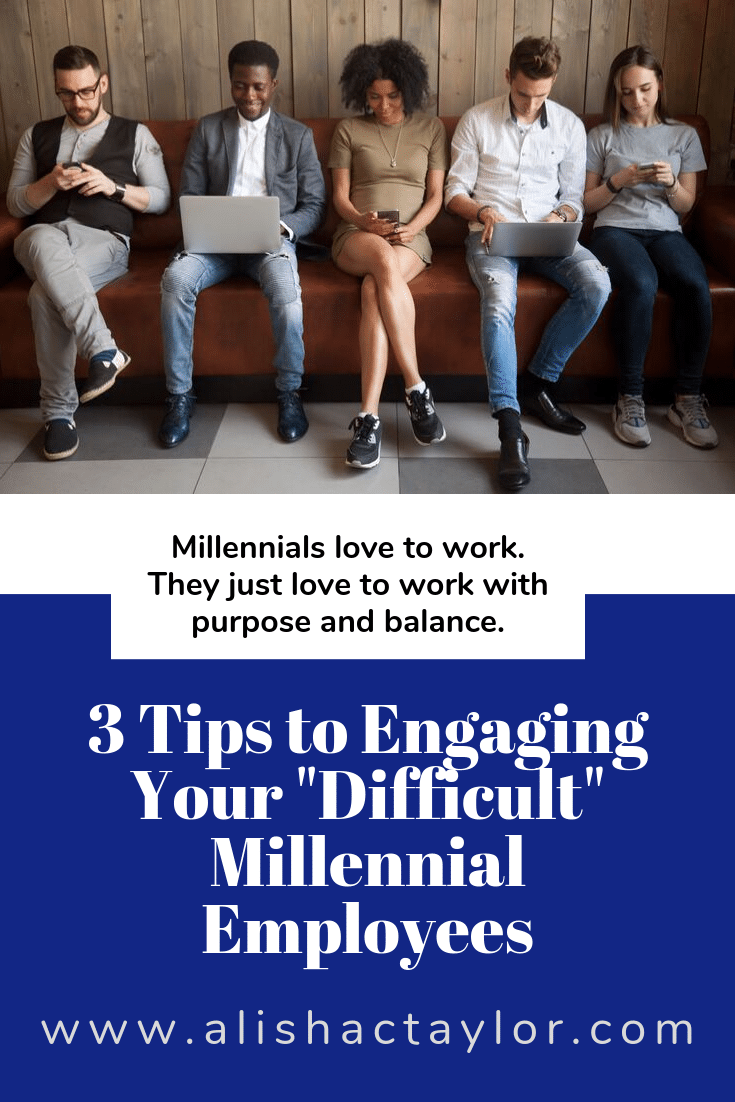
“I have millennials who work for me who don’t feel like they have to work hard, but still want to get promoted. What is the deal here?”
Ah, millennials—born between ~1980-1995. They’re hurting the world economy because they’re not buying homes, cars, goods, or services. They’re killing nostalgic brands and brick and mortar stores because they’re spending money on experiences instead (full disclosure: I am an “old” millennial).
Millennials have the reputation of being “unmanageable” because they don’t respond to the typical “carrot” of a paycheck nor to the “stick” of a poor performance review. In fact, the millennial mantra is “Make us happy, or we’ll walk out.”
They must have something good to offer underneath their disagreeable exterior. So how can you achieve results with your “difficult” millennial workers?
1. Earn respect, and then work to keep it
In general, you can’t accomplish much in a team setting without establishing trust. Unfortunately, due to high-profile criminal cases and focus on child safety starting in the 80s, millennials are the first generation to grow up learning to question adults—including family and authority figures like you.
It doesn’t matter that you are their manager, have more degrees, are older, or have a higher status. Millennials’ trust needs to be earned. It is not given out freely.
They will ask a lot of questions, jump in and offer suggestions, and provide feedback, but will never consider blindly doing what they’re told (insert tales of Enron and corporate scandals). A “command and control” company culture will not be tolerated by millennials.
Their words and actions may come across as a lack of respect or even insubordination, but the truth is that you haven’t connected with or mentored millennial workers to earn their respect or trust in the first place.
Gaining trust isn’t a quick or easy process, but here are some steps you can take:
- Give your trust
- Act authentically and demonstrate care for them
- Set up regular times to meet and check in with them
- Show your support, especially if they’ve made a mistake
- Consider their ideas and opinions
- Align your words and actions.
- Be dependable.
2. Find their passions, and let them delight you
“Millennials…..I can’t believe they leave the office right at 5 PM; there’s more work to do! It’s not like they have families or anything else to do!”
Millennials love to work. They just love to work with purpose and balance.
I grew up with hard-working parents. They worked so much that they would have to miss games, awards, banquets, and even had to stay back while the rest of the family went on vacation—all in the name of work. However, when times got tough at their companies, their sacrifices still resulted in pay cuts, demotions, and layoffs. I grew up seeing that there’s a need for balance between work and personal life.
Millennials have commitments and obligations just like everyone else and have seen first-hand what it looks like not to have a balance.
So, instead of assuming they have nothing better to be doing with their time when not working, take the time to learn about and mentor your millennial workers. Here are some questions you can ask to find out what is important to them:
- Do you like to learn?
- Do you volunteer anywhere?
- How often do you like to spend time with family/friends? What do you do when you’re with them?
- Do you travel? If so, where?
- If you had a free day, how would you spend it?
Great! Now you’ve shown that you care about them and they’ll want to care about you back.
If you see a risk that your team will need to stay late next week to meet deliverables, work with the team ahead of time to communicate this. Can you offer the option for all employees to work flexible times and work remotely on personal goals?
Chances are, your up-front communication and flexibility will allow them to accomplish goals with increased quality and ahead of schedule while meeting their need for balance!
3. Practice abundance and share your gifts
There’s a term in our workplace the “knowledge dragon.” This refers to a worker that sits on a treasure trove of knowledge and refuses to share, teach, or engage until they’re poked or prodded. Millennials abhor the knowledge dragon.
Dragons are mistaken in the belief that their actions provide perpetual job security when instead the new “go-giver” careerist is far more favored. Go-givers expand their influence beyond a specific company and have career security because they readily help others.
Here’s what you can do to lose your status as a knowledge dragon:
- Provide introductions and access to your network
- Have those conversations about a career and not just the job they have right now
- Offer and (gracefully) receive feedback
- Work with millennials on their goals
- Schedule and practice employee recognition
- Learn where millennials’ passions and strengths coincide and allow them to lead an employee, group, or even a subproject.
While working with millennials may seem like an impossible feat, they come with a code and they can be cracked! Engaging with them begins by earning their respect. Uncover their passions and respect their need for balance to see them come back on fire to get work accomplished for you and the team. As their superior, you have ample knowledge. While you think it may be providing you with job security, no one likes a knowledge hoard—especially the millennial. Be a go-giver! By practicing engaging your “difficult” millennial workers who knows…you may just learn a few things, see increased productivity, and come to enjoy working with them!


